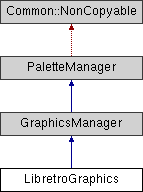|
|
Common::List< Graphics::PixelFormat > | getSupportedFormats () const override |
| |
|
const OSystem::GraphicsMode * | getSupportedGraphicsModes (void) const override |
| |
|
void | initSize (uint width, uint height, const Graphics::PixelFormat *format) override |
| |
|
int16 | getHeight (void) const override |
| |
|
int16 | getWidth (void) const override |
| |
|
Graphics::PixelFormat | getScreenFormat (void) const override |
| |
|
void | copyRectToScreen (const void *buf, int pitch, int x, int y, int w, int h) override |
| |
|
void | updateScreen (void) override |
| |
|
void | clearOverlay (void) override |
| |
|
void | grabOverlay (Graphics::Surface &surface) const override |
| |
|
void | copyRectToOverlay (const void *buf, int pitch, int x, int y, int w, int h) override |
| |
|
int16 | getOverlayHeight (void) const override |
| |
|
int16 | getOverlayWidth (void) const override |
| |
|
Graphics::PixelFormat | getOverlayFormat () const override |
| |
|
const Graphics::ManagedSurface * | getScreen (void) |
| |
| void | warpMouse (int x, int y) override |
| |
|
void | setMouseCursor (const void *buf, uint w, uint h, int hotspotX, int hotspotY, uint32 keycolor=255, bool dontScale=false, const Graphics::PixelFormat *format=NULL, const byte *mask=nullptr) override |
| |
|
void | setCursorPalette (const byte *colors, uint start, uint num) override |
| |
|
bool | isOverlayInGUI (void) |
| |
|
bool | hasFeature (OSystem::Feature f) const override |
| |
|
void | setFeatureState (OSystem::Feature f, bool enable) override |
| |
|
bool | getFeatureState (OSystem::Feature f) const override |
| |
|
int | getDefaultGraphicsMode () const override |
| |
|
bool | setGraphicsMode (int mode, uint flags=OSystem::kGfxModeNoFlags) override |
| |
|
int | getGraphicsMode () const override |
| |
|
Graphics::Surface * | lockScreen () override |
| |
|
void | unlockScreen () override |
| |
|
int | getScreenChangeID () const override |
| |
|
void | beginGFXTransaction () override |
| |
|
OSystem::TransactionError | endGFXTransaction () override |
| |
|
void | fillScreen (uint32 col) override |
| |
|
void | fillScreen (const Common::Rect &r, uint32 col) override |
| |
|
void | setFocusRectangle (const Common::Rect &rect) override |
| |
|
void | clearFocusRectangle () override |
| |
|
void | realUpdateScreen (void) |
| |
| bool | gameNeedsAspectRatioCorrection () const override |
| |
| void | handleResizeImpl (const int width, const int height) override |
| |
| void | setSystemMousePosition (const int x, const int y) override |
| |
|
void | setMousePosition (int x, int y) |
| |
|
void | displayMessageOnOSD (const Common::U32String &msg) override |
| |
|
void | showOverlay (bool inGUI) override |
| |
|
void | hideOverlay () override |
| |
|
bool | isOverlayVisible () const override |
| |
|
Common::Rect | getSafeOverlayArea (int16 *width, int16 *height) const override |
| |
|
void | setShakePos (int shakeXOffset, int shakeYOffset) override |
| |
|
int | getWindowWidth () const |
| |
|
int | getWindowHeight () const |
| |
|
void | setIgnoreGameSafeArea (bool ignoreGameSafeArea) |
| |
|
virtual bool | setShader (const Common::Path &fileName) |
| |
|
virtual const OSystem::GraphicsMode * | getSupportedStretchModes () const |
| |
|
virtual int | getDefaultStretchMode () const |
| |
|
virtual bool | setStretchMode (int mode) |
| |
|
virtual int | getStretchMode () const |
| |
|
virtual bool | setRotationMode (Common::RotationMode rotation) |
| |
|
virtual uint | getDefaultScaler () const |
| |
|
virtual uint | getDefaultScaleFactor () const |
| |
|
virtual bool | setScaler (uint mode, int factor) |
| |
|
virtual uint | getScaler () const |
| |
|
virtual uint | getScaleFactor () const |
| |
|
virtual void | initSizeHint (const Graphics::ModeList &modes) |
| |
|
virtual void | presentBuffer () |
| |
|
virtual float | getHiDPIScreenFactor () const |
| |
|
virtual void | displayActivityIconOnOSD (const Graphics::Surface *icon) |
| |
|
virtual void | saveScreenshot () |
| |
|
virtual bool | lockMouse (bool lock) |
| |
|
void | setPalette (const Graphics::Palette &pal, uint start=0) |
| |
|
Graphics::Palette | grabPalette (uint start, uint num) |
| |
| void LibretroGraphics::grabPalette |
( |
byte * |
colors, |
|
|
uint |
start, |
|
|
uint |
num |
|
) |
| const |
|
overrideprotectedvirtual |
Grabs a specified part of the currently active palette. The format is the same as for setPalette.
This should return exactly the same RGB data as was setup via previous setPalette calls.
For example, for every valid value of start and num of the following code:
byte origPal[num*3]; // Setup origPal's data however you like g_system->setPalette(origPal, start, num); byte obtainedPal[num*3]; g_system->grabPalette(obtainedPal, start, num);
the following should be true:
memcmp(origPal, obtainedPal, num*3) == 0
- See also
- setPalette
- Parameters
-
| colors | the palette data, in interleaved RGB format |
| start | the first platte entry to be read |
| num | the number of palette entries to be read |
- Note
- It is an error if this function gets called when the pixel format in use (the return value of getScreenFormat) has more than one byte per pixel.
- See also
- getScreenFormat
Implements GraphicsManager.

 Public Member Functions inherited from WindowedGraphicsManager
Public Member Functions inherited from WindowedGraphicsManager Public Member Functions inherited from GraphicsManager
Public Member Functions inherited from GraphicsManager Public Member Functions inherited from PaletteManager
Public Member Functions inherited from PaletteManager Protected Member Functions inherited from WindowedGraphicsManager
Protected Member Functions inherited from WindowedGraphicsManager Protected Attributes inherited from WindowedGraphicsManager
Protected Attributes inherited from WindowedGraphicsManager